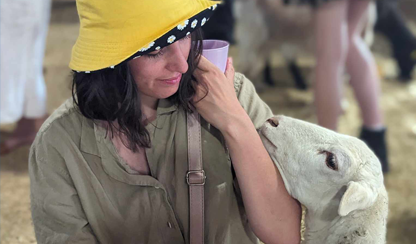
It's no surprise that PhD student Auriane Drack's research focuses on cell-cell communication — she's all about good communication, whether that's through her role as Chair of the Baker Institute Student Committee, or as a prize-winning FameLab science competition communicator. Learn more about Auriane in this Fast Five.
What inspired you to pursue science and how did you find your way to the Baker Institute to pursue it?
I grew up in a family of social scientists and economists, so I initially thought I'd follow that path too, maybe becoming an anthropologist or journalist. But during my last year of high school, I realised my curiosity lay outside of social sciences — I wanted to understand how the world works on a molecular level. My biology teacher, Ms. Pirog, really sparked my love for biology and set me on this path.
When I came to Australia in 2018 for a gap year, I did a short internship at Peter MacCallum where Gabriella Farrugia was working. She later moved to the Baker Institute with Alex Pinto, and thanks to her, I landed an internship there too. It's funny — three years later, when I applied to do my PhD with David Greening, he had just moved his lab to the Baker Tower from La Trobe!
What has been your research highlight to date and what would your Eureka moment be?
The highlight of my research has been delving into cell-cell communication via extracellular vesicles (EVs). These tiny bubbles are incredible because they transport a variety of molecular signals — like proteins and RNAs — that can significantly impact cellular behaviour and tissue repair. Their versatility allows them to modulate immune response, regulate fibrosis, help cell survive and promote formation of new blood vessels, making them a key focus in regenerative medicine.
My PhD aims to develop a cardiac patch using engineered nanovesicles (NVs) that mimic EVs from human stem cells combined with photo-crosslinked silk hydrogels. My Eureka moment would be proving that our nanovesicle-silk hydrogel cardiac patch can significantly improve heart function and tissue regeneration after a heart attack. If we succeed, it could revolutionise how we treat heart disease with a minimally invasive option that offers real hope for recovery and could impact regenerative medicine on a broader scale.
It's a big leap to leave family and move to the other side of the world. What advice do you have for other students considering a big move for their studies?
Taking the leap to study abroad is huge, but it's also a fantastic opportunity for growth. My advice is to dive in — join groups, societies, and committees. Getting involved helps you build a network, find support, and immerse yourself in the new culture. Being part of the Student Committee was crucial for me in making connections and gaining confidence.
Getting science out into the broader community is something you're passionate about. How important is good science communication?
Good science communication is crucial because it makes complex ideas accessible and engaging for everyone. It's not just about relaying facts; it's about connecting with people and making science relevant to their lives. That's why I'm thrilled about my recent trip to Perth as one of 12 national finalists in FameLab science competition, where I was awarded a runner-up trophy for my presentation, Joining forces to repair broken hearts. It was a wonderful experience and a great chance to hone my skills in communicating science effectively with the general public and contributing to making science more impactful.
Tell us something about yourself that most of your colleagues wouldn't know.
Most of my colleagues might not know that I have a big passion for farming. If I weren't a scientist, I'd probably be a farmer. One of my favourite experiences was spending a summer making goat cheese in the south of France. I absolutely loved it, and being around farm animals is incredibly soothing for me — it's a great way to unwind and find balance.






